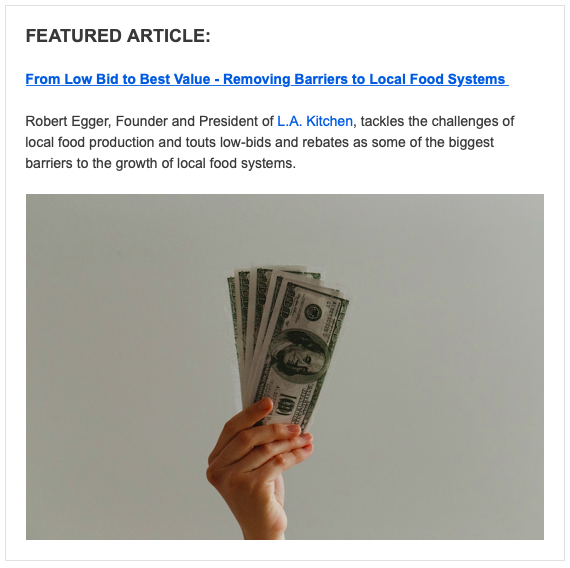|
By Food System 6 Digging into... VALUES-BASED PURCHASING This newsletter marks the first in our Dig In series, where we will be taking a closer look at some of the many facets of food system change, topic-by-topic. This new format will provide you with expert opinions, resources, and guides to better understand some of the most crucial elements of an often opaque, and deeply complex industry. First up is an examination of the systems in place that support and restrict values-based purchasing practices across local communities. A central component of this conversation is the role that institutional and mid-sized foodservice operations play in addressing the monopoly that large-scale distributors have on purchasing relationships. But first, some background: To better understand the topic, let's step back and take a look at the building blocks of the local food marketplace. First off, there are institutional foodservice operators - like schools, colleges, prisons, hospitals, and other federally and privately funded small-large scale operations. These institutions serve thousands of meals a day, often to underserved communities, and tend to buy their food based on the lowest possible bid, due to thin margins and limitations around funding. The second vertical within the local procurement space are private foodservice operations like corporate cafeterias, museums, sports arenas, etc. which tend to have slightly larger margins than the big guys - varying, of course, on a case-by-case basis. Oftentimes, these businesses are serviced by the same food operators as the institutional purchasers, as large-scale operators work across different markets. The third leg of the stool is made up of the hospitality marketplace - including restaurants, caterers, ghost kitchens, food delivery, and meal kits. These businesses have a variety of diversified purchasing agendas but, as a whole, they make up a significant market for purchasing local, sustainably grown food. ** For the topic of this conversation, we are going to focus on institutional and private foodservice operations, largely because of the opportunity for impact that lies dormant within the sector, but also because the purchasing power of restaurants, grocery, and other direct-to-consumer outlets is a unique model that probably deserves a newsletter of its own one of these days. The Opportunity: Due to the size and reach of their food programs (even just in schools in the US, around 100,000 campuses serve lunch to 29.8 million students each day), institutional and private foodservice operations have the buying power to fundamentally change the shape of the American food landscape. These companies have the capacity to invest in local businesses, create jobs, and support local economies in a truly impactful way - whether by sourcing their food from mid-sized local producers who have the capacity to meet their demands, or by working with aggregates that are pooling from smaller scale farms within their community. So, what's the problem? The barrier to action in the institutional foodservice space is embedded in purchasing monopolies and institutionalized incentives, like rebates, that work to maintain the status-quo. In the featured article below, Robert Egger lays out the challenges associated with monopoly purchasing and rebates. Learn more about it:Why buy local? Supporting local farmers is a multifaceted solution that not only helps strengthen local economies, but also addresses systemic inequalities by creating job opportunities across the supply chain, feeding vulnerable populations, and supporting entrepreneurs of color. The importance of mid-sized farms: Shifting institutional foodservice procurement to support these mid-sized local producers has the potential to help combat the "hallowing out of the middle" that we are continuing to see across the country. In this day and age, mid-sized farms are being driven to either "get big or get out" (a saying with its own fascinating history). According to the USDA Ag Census, grower debt has reached a record $427 billion - the highest debt-to-income ratio since the 1980s. This trend is largely affecting mid-sized producers, who have taken on more risk than the small family farm, but do not yet have the economies of scale that you see in large-scale commodity operations. What about small-scale farmers? For small- and mid-scale farms that want to participate in the local economy in larger ways, the growing focus on regional food hubs presents an opportunity to aggregate local products in order to meet the demands of larger-scale institutional buyers. And, despite the hurtles, the food hub model is proving to be a successful tool for local economies. Need some help visualizing a roadmap? There are great examples from across water, transportation, and energy that can help to visualize a roadmap for success. Not to mention, the many wins that we are already seeing across the foodservice industry thanks to the hard work of ecosystem players like those listed below. Speaking of maps: If you haven't already seen it, the first map of America's food supply chain is mind-boggling. Extra! What happens when rebates go wrong? Learn more about the $19 million settlement on the whistle blower lawsuit brought on by accusations that Chartwells, a subsidiary of Compass Group, was shorting the city of D.C. millions of dollars it was due in rebates. What's the solution?There is general consensus in impact-focused communities that building pathways to local food procurement for institutional and private foodservice operators is crucial to bolstering local food economies. However, there are a range of solutions across the industry that are each working towards these goals in unique ways. You can learn more about a few of the players who are tipping the economic scales to support values-based local food procurement below. The following businesses and non-profits are working to transform the local food economy in a variety of ways. This is, needless to say, just a small sampling of those working in the space. If you have any specific questions about innovations in this sector, or think we should know about any players in the space, please reach out to content@foodsystem6.org. The Center for Good Food Purchasing (FS6 Portfolio) is the non-profit that houses the Good Food Purchasing Program, which transforms the way public institutions purchase food by creating a transparent and equitable food system built on five core values: local economies, health, valued workforce, animal welfare, and environmental sustainability. The Center for Good Food Purchasing provides a comprehensive set of tools, technical support, and verification system to assist institutions in meeting their Program goals and commitments. The Common Market (FS6 Portfolio) The Common Market is a nonprofit regional food distributor with a mission to connect communities with good food from sustainable family farms. We strive to improve food security, farm viability, and community and ecological health. Currently operating in the Mid-Atlantic, Georgia, and Texas, The Common Market is expanding to other U.S. regions to build a nation of vibrant regional food systems. Choose a location to become a customer, producer or to learn more about our local initiatives. Fare Resources (FS6 Portfolio) designs and manages impact-driven food programs for non-profits, restaurants, farms and tech companies. Their goal is to transform the institutional food system to do good for the world. HEAL Food Alliance’s mission is to build our collective power to create food and farm systems that are healthy for our families, accessible and affordable for all communities, and fair to the hard-working people who grow, distribute, prepare, and serve our food — while protecting the air, water, and land we all depend on. Capay Valley Farm Shop is a dynamic rural food hub that supplies San Francisco Bay Area businesses with locally grown food. We pride ourselves on our ability to connect rural and urban communities. Established in 2007, Farm Shop is a community-owned social enterprise that markets and distributes exceptional food from more than 40 small and mid-sized farms and ranches in Yolo County. Kitchen Table Advisors fuels the economic viability of sustainable small farms and ranches through practical business advising and trusted relationships. They provide farmers with access to the tools, knowledge and resources they need on their path to become resilient and viable businesses. Through our business and financial advising, we help farmers build the foundation for a successful future.
Comments are closed.
|
FS6 is a nonprofit based in the San Francisco Bay Area whose mission is to support impact-driven entrepreneurs as they transform how we grow, produce, and distribute food. The organization runs a comprehensive accelerator program that mentors entrepreneurs by coaching them through a wide range of business and organizational needs. FS6 also works to educate stakeholders on the unique capital needs as it relates to redefining the food system. Categories
All
Archives
August 2021
|





 RSS Feed
RSS Feed
